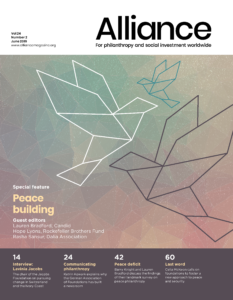Start by changing a person, changing a community, changing a society – this remains key.
It’s been a tense year working in community relations, from rioting at Easter with water cannons on the street of Belfast, to months of protests on the protocol. Working in Peacebuilding for over 20 years my focus is on getting to the heart of the issues in order to support communities. As Director of Peacebuilding and Communities in the Community Foundation for Northern Ireland, my team and I collaborate with partners and funders, to support communities find solutions to difficult, often complex, multifaceted issues.
Peacebuilding is very relationship-driven. Quite often the money element is insignificant to the outcomes it supports, having the right people in place is priceless, as they make the space to allow for peacebuilding and change to take place, in a very natural way and at a pace appropriate to where people are. The truth of the matter is that we cannot take our eye off peacebuilding, when we do, it can quickly unravel. The work we do is cyclical, by keeping at it we get better, we change opinions, we change minds, we rebuild communities.

For more on philanthropy and peacebuilding, read Alliance magazine’s June 2019 print issue.
The Peace Impact Programme, managed by the Foundation and supported by the International Fund for Ireland (IFI), helps build sustainable peace and prosperity in communities, especially in areas where the peace process has had limited outcomes for them. Areas include Newry, South Armagh, Portadown, Derry/Londonderry, Belfast and Mid Ulster, where some communities are struggling with issues related to paramilitarism, disadvantage, social and economic deprivation. Using our networks, the Foundation has spent time engaging with local organisations who are trying to make their community a better place and wish to go on a journey of transition.
Relationships and understanding are key, I see this daily within my team who take a bottom-up approach to engagement, enabling communities to build projects to help their areas. Local solutions to local issues can provide an excellent blueprint for others.
Bringing forward new projects to support groups and communities to have difficult and challenging conversations related to the conflict, gatekeeping, paramilitarism and peacebuilding is essential, and a key focus of the Peace Impact Programme which is part of IFI’s ‘Connecting Communities’ strategy. With Northern Ireland being a very diverse, multicultural community, some issues will change, new issues will emerge, and there remains much to do in the communities already in a place of disadvantage to support their needs. Programmes like these are essential to make this happen.
Earlier this year a Covid report undertaken by the Foundation highlighted that 71 per cent of communities pulled together more efficiently as a team during lockdown. For some projects, this meant significant, albeit welcome, change. Groups primarily involved in ‘traditional’ peacebuilding work, shifted their focus to support their communities through the pandemic. There was more cross-community and partnership working which allowed for relationships to develop and flourish, much quicker than normal. Groups were cross networking in areas both within and beyond their locality, with groups in mid-Ulster supporting others in mid and east Antrim and vice versa, enabling a huge amount of cross networking and relationship building. Divisions were put to the side, there was a palpable sense of ‘we are all in this together’.
However, as phases of the pandemic have ebbed and flowed, so too has the way communities respond and prioritize support to each other. It’s encouraging that many of the relationships established during this time have been enhanced and continue to develop.
Having been involved in Peacebuilding for over two decades, I have witnessed amazing progress in communities, moving from ‘very dark times when we lived with high levels of division, more physical barriers which limited movements’ to now having a reduction in some of these physical ‘peace’ barriers, a thriving economy, and a more diverse population – the landscape has changed exponentially. That said, I know that for some the trauma of the conflict remains, the impact of which cannot be underestimated.
Whilst the fear may not be as strong, for some people the effects and impact of the conflict are felt as if it was yesterday. The events of summer 2021, general unrest and ongoing protests linked to the protocol, policing, sovereignty, identity, and culture remain a concern and as we enter 2022 and an election year reinforces that a huge amount of work remains. We must engage everyone, particularly young people in our peacebuilding process; to break down barriers and help lead change in all communities. Significant challenges remain; however, I know from experience that we can enable different thinking, embrace new relationships and build peace.
To young people, or anyone wanting to make a positive difference in their community, don’t think about it, just do it – help a neighbour, a friend, just be a good citizen. Volunteer, make a difference in your community, start with what you like and build from there. Seek out projects you are interested in and get involved.
The Community Foundation supports Peacebuilding and Communities through a number of funds communityfoundationni.org
Dawn Shackels is the Director of Peacebuilding and Communities in the Community Foundation for Northern Ireland.






Comments (0)